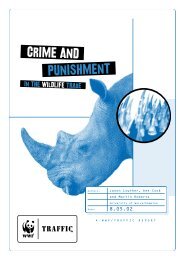In full swing: assessment of trade in orang-utans and ... - WWF UK
In full swing: assessment of trade in orang-utans and ... - WWF UK
In full swing: assessment of trade in orang-utans and ... - WWF UK
You also want an ePaper? Increase the reach of your titles
YUMPU automatically turns print PDFs into web optimized ePapers that Google loves.
The only exceptions to these rules are stated under Article 22:<br />
(1) Any exception from the prohibition perta<strong>in</strong><strong>in</strong>g to Article 21 can only be permitted for purposes <strong>of</strong> research, science,<br />
<strong>and</strong>/or safeguard<strong>in</strong>g those plants or animals<br />
(2) Safeguard<strong>in</strong>g efforts perta<strong>in</strong><strong>in</strong>g to paragraph (1) shall <strong>in</strong>clude deliver<strong>in</strong>g or exchang<strong>in</strong>g a plant or animal species with<br />
foreign <strong>in</strong>stitutions, with permit from the Government.<br />
(3) An exception to the prohibition to catch, to <strong>in</strong>jure, or to kill a protected animal can only be permitted <strong>in</strong> case the<br />
animal endangers human life.<br />
Penalties that can be imposed when these laws are broken can total up to IDR100 000 000 (USD12 000 at 2004 rates)<br />
<strong>in</strong> f<strong>in</strong>es <strong>and</strong> imprisonment for up to five years.<br />
Up until 1995, there was a possibility to obta<strong>in</strong> an exemption from the above [under permit Surat Keputusan 301],<br />
permitt<strong>in</strong>g private owners to keep protected animals. Although these permits are now no longer h<strong>and</strong>ed out, given that<br />
gibbons <strong>and</strong> <strong>orang</strong>-<strong>utans</strong> can live up to an old age <strong>in</strong> captivity, a number <strong>of</strong> these animals may <strong>in</strong>deed cont<strong>in</strong>ue to be<br />
legally owned by private persons. At the same time, the circulation <strong>of</strong> these permits creates a loophole as they reta<strong>in</strong><br />
their value after the animal <strong>in</strong> question is deceased. Although possession <strong>of</strong> the animal might be illegal, rarely is the age<br />
(or even species identity) <strong>of</strong> the animal as mentioned <strong>in</strong> the permit checked aga<strong>in</strong>st the age <strong>of</strong> the animal that is kept,<br />
<strong>and</strong> as such, legally protected animals could be safely, <strong>and</strong> illegally, kept by private owners.<br />
With respect to the protected status <strong>of</strong> gibbons <strong>and</strong> <strong>orang</strong>-<strong>utans</strong> <strong>in</strong> neighbour<strong>in</strong>g countries, it is worthwhile to note that<br />
all species are protected under Malaysian law (apart from Müller’s gibbon <strong>in</strong> Sabah which is classified as a 'protected<br />
species', all species <strong>of</strong> gibbon <strong>and</strong> <strong>orang</strong>-utan are 'totally protected species' <strong>in</strong> Sabah, Sarawak <strong>and</strong> Pen<strong>in</strong>sular Malaysia).<br />
There are no wild populations <strong>of</strong> gibbon or <strong>orang</strong>-utan <strong>in</strong> S<strong>in</strong>gapore.<br />
<strong>In</strong>ternational treaties<br />
<strong>In</strong>donesia acceded to the Convention on <strong>In</strong>ternational Trade <strong>in</strong> Endangered Species <strong>of</strong> Wild Fauna <strong>and</strong> Flora (CITES)<br />
on 28 March, 1978. All species <strong>of</strong> gibbon <strong>and</strong> both species <strong>of</strong> <strong>orang</strong>-utan are listed <strong>in</strong> Appendix I <strong>of</strong> CITES, which<br />
prohibits all <strong>in</strong>ternational commercial <strong>trade</strong> <strong>of</strong> the species, its parts <strong>and</strong> derivatives, among contract<strong>in</strong>g parties, except<br />
under specific circumstances. It is the responsibility <strong>of</strong> the Directorate General <strong>of</strong> Forest Protection <strong>and</strong> Nature<br />
Conservation, as <strong>In</strong>donesia's Management Authority for CITES, to ensure that illegal <strong>in</strong>ternational <strong>trade</strong> <strong>of</strong> these species<br />
is prevented (Soehartono & Mardiastuti, 2002).<br />
METHODS<br />
Data acquisition<br />
Market surveys<br />
<strong>In</strong> the period 23 August - 18 October 2003, a total <strong>of</strong> 23 bird markets (<strong>in</strong> Sukabumi, Bogor, Jakarta, B<strong>and</strong>ung,<br />
Yogyakarta, Malang, Surabaya, <strong>and</strong> Denpasar) were visited <strong>and</strong> data on the presence or absence <strong>of</strong> gibbons <strong>and</strong> <strong>orang</strong><strong>utans</strong><br />
was collected. The surveys were conducted by the author, sometimes accompanied by one or two members <strong>of</strong><br />
local NGOs. Additional surveys were conducted by three local assistants <strong>and</strong> covered the cities <strong>of</strong> B<strong>and</strong>ung, Sumedang,<br />
Cirebon, <strong>In</strong>dramayu, Tegal, Purwokerto, Banyumas, Semarang, Yogyakarta, Muntilan, <strong>and</strong> Surakarta Opportunistic<br />
market surveys were conducted by the author over the period 1994-2000, largely <strong>in</strong> the Jakarta-Bogor area (1994, 1997-<br />
IN FULL SWING:ASSESSMENT OF TRADE IN ORANGUTANS AND GIBBONS ON JAVA AND BALI,INDONESIA 9


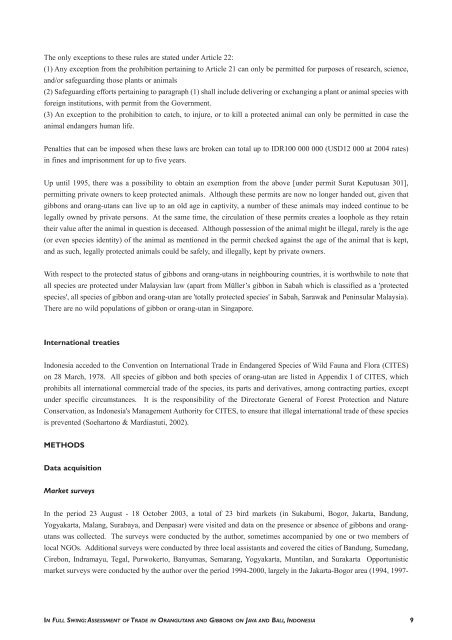
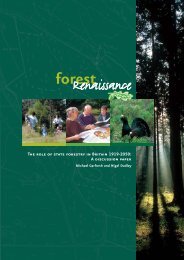
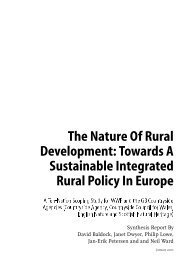
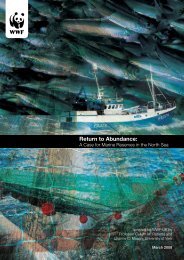

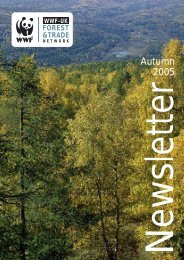
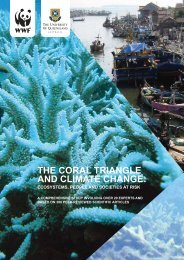
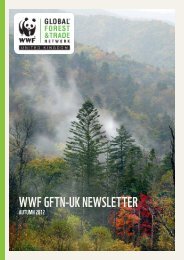
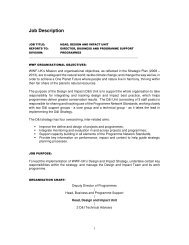
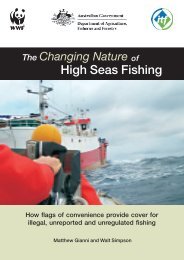
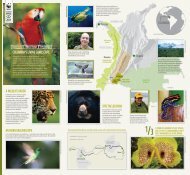
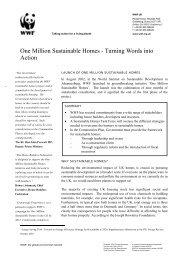
![[PDF] Causes for concern: chemicals and wildlife - WWF UK](https://img.yumpu.com/31929970/1/184x260/pdf-causes-for-concern-chemicals-and-wildlife-wwf-uk.jpg?quality=85)
